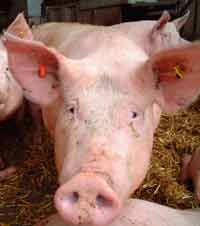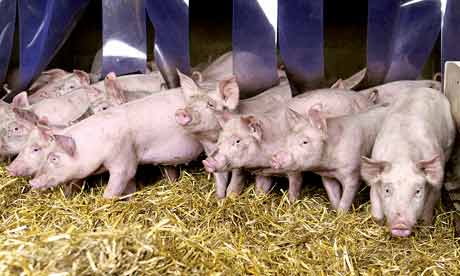Control and efficiency key for pig success

Control was the theme of the recent BPEX Change for Success meeting, which saw more than 100 delegates attending to find out how to make their business more efficient.
However, it wasn’t just control in the current economic market place that was discussed, but taking control of consumers and on farm by analysing data.
And the upbeat atmosphere and positive messages coming from the speakers meant there wasn’t a sleepy eye or indeed a dry eye in house when Imperial College’s David Hughes referred to supermarkets as “grizzly bears and not teddy bears”. He said collective strength was needed in the market place to secure a future for pork meat.
“With fewer, large and more powerful supermarkets, farmers are going to have to stand up and make a case or they will be stamped on,” said Prof Hughes.
Communication with consumers was essential to survive, he said. “If you don’t listen and satisfy consumer demands, you will not have a business. Consumers are relentless task masters who want convenience, better tasting, better priced, healthier and environmentally sustainable produce and if we don’t provide that they will source from elsewhere.”
Brazil offered one of the lowest costs of production in the world at the moment and there was every possibility of imports coming from there to UK retailers.
“Although the UK may have the lowest costs of production in the EU at the moment because of the exchange rate, this is not long-term. The UK pig industry is not low-cost production and one way to combat cheaper imports is to focus on premium products and explaining to consumers why British shoppers should pay a premium.
“Adding value whether on farm by optimising scale, technology and management or focussing on commodity markets and the value chains earning higher margins can help. But the most important thing is to think value chain, build in consumer value and remove non-value costs,” he said.
Sharing information and benchmarking was also something Prof Hughes said determined those top-third of producers. But to transform the way to do business, you needed accurate records to begin with.
Record keeping
Continuing the record keeping theme was Roger Meadows of Alexander and Angell Farms who told delegates that failing to have sufficient information on herd performance could be a significantly limiting factor in increasing profitability.
Having decided they didn’t have enough information on the pig unit to make positive changes, Mr Meadows altered the way they worked, introducing recording and reporting systems.
“You have to manage your unit by numbers and you can’t manage what you don’t measure. Consequently, we installed various recording systems from Agrosoft Winpig for the breeding unit and “in house” water consumption and temperature loggers on the rearing unit.
“We wanted information on pig performance throughout the system, so we not only started tattooing piglets’ ears for identification of age and breed, we also decided to weigh pigs at regular intervals,” he said.
Inserting portable load cell pads where pigs were weighed in a trailer enabled Mr Meadows to capture exit weights from each of the growing stages.

Failing to monitor performance accurately means there is little information to base management decisions on and hence make meaningful changes to farm practice
“Weighing pigs has enabled us to sit down with breeding and feeding companies to talk about what we should be achieving. We have also set achievable weight-for-age targets, with the aim being to have everything gone by 23 weeks. At four weeks old if anything is under weight they are placed in separate accommodation and fed differently in order that they catch up,” he said.
“At the moment we are averaging 96.1kg at 22 weeks, although we want this to be 102.5kg. But we are not quite there yet, so further changes have been made. But by measuring, analysing and implementing changes throughout finishing, we have already improved growth rate in the nursery and grower pigs.”
This extra knowledge had enabled Alexander and Angell Farms to select pigs for the appropriate contract, maximising income. And by improving growth rates and time to slaughter stocking density and pen clearance had also improved
“The time used for recording and analysing information is a worthwhile investment and necessary for the continued improved of the unit,” added Mr Meadows.
